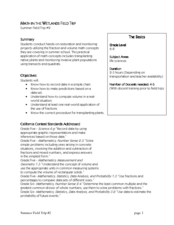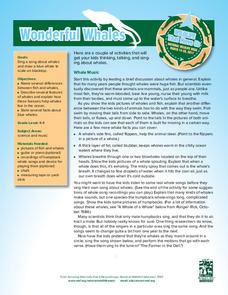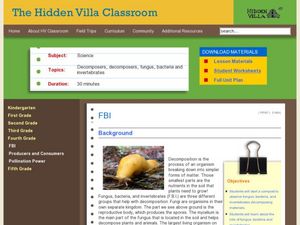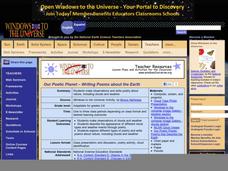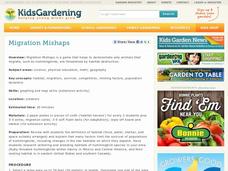Curated OER
Fossil Formation
A fossil is worth a thousand words! Individuals craft their own amber fossil of an insect in addition to molds and casts of seashells. A third activity takes the lesson a notch higher: Learners measure stride lengths between tracks and...
Curated OER
Math in the Wetlands Field Trip
Get your class out in the environment for hands on math activities. In this wetlands lesson, learners transplant native plants, calculate how much soil is needed, and perform math activities based on this experience. They then make...
Curated OER
Alfonso Ball
Joey Alphonso made up this game, which is played using a gator skin ball and a tennis racket on a basketball court. The simple rules and strategy of the game are explained. This is a high-scoring, run around activity. Everyone can...
Wild BC
Carbon Sinks and Sources
Earth or environmental science pupils are assigned to be carbon sources or sinks. They ask yes-or-no questions to try to figure out which one they are. Then they discuss ways people can have positive effects on the changing climate by...
Curated OER
Wonderful Whales
Primary marine biologists consider the largest living animals on Earth, the whales. Introduce them to general anatomy, unique adaptations, and behaviors. Teach them to sing a song that will help them remember some of these facts....
Habitat Conservation Trust Foundation
Greenhouse Gas Game
You will need to gather a number of tokens, bags, and other various game components in order to incorporate this activity into your curriculum. Different tokens represent carbon dioxide, methane, and nitrous oxide. Printable 8.5"x11"...
Curated OER
Pollution
Young ecologists investigate some of the many ways that human activities adversely affect the environment. After identifying the main types of pollution (air, water, soil), 3rd graders fill in a Venn Diagram by pasting cut-out pictures...
Curated OER
Good Vibrations Remote Sensing data Collection: Thermal Emission Spectrometer
The Mars Global Surveyor spent two years creating a mineral map of the planet Mars using thermal emission spectrometry. To help young astronomers understand this remote sensing instrument, have them simulate how data is collected and...
Curated OER
FBI
Fourth graders experiment with compost. In this Science lesson, 4th graders begin a worm compost as well as an outdoor compost. Students discuss decomposition.
Curated OER
Our Poetic Planet - Writing Poems about the Earth
As a way to combine language arts and science, try this lesson on writing cloud poetry. Begin by showing a PowerPoint presentation and images of cloud types. Take meteorology masters outdoors to explore the sky using the provided "Cloud...
University of Kentucky
Beneficial Bug Scavenger Hunt
Many people think of bugs as annoying pests to be squashed, but most insects and spiders are beneficial, eating the actual pests or pollinating plants. After reviewing some of the common bugs in your area (they may differ from those...
National Gardening Association
Migration Mishaps
Elementary ecologists pretend to be migratory hummingbirds. They fly between wintering and nesting grounds, trying to reach a habitat haven. In a musical-chair fashion, some birds will miss out, and are removed from the game. To further...
Space Awareness
Making A Sundial
Can people really measure time just by using the sun? Scholars venture outside on a nice, sunny day to build sundials and learn how people measured time 600 years ago. The class builds two different sundials while gaining practice with...
Captain Planet Foundation
Sorting Out Soils
Sift through soil and learn about why it's important for organic processes. After discussing what makes up soil, such as the living organisms and what types of soil have more nutrients, kids sample layers of mulch and deeper soil to...
Curated OER
Outdoor Photography with Digital Cameras
Learners become familiar with perspective, composition and framing of pictures. For this photographing nature lesson, students photograph and then describe their pictures in a paragraph. Learners build pictures to tell a story about...
Curated OER
Outdoor Observations
Fifth graders attain data using their senses. They record information. They develop observation skills and explore how to investigate. They gain appreciation for nature through their observations.
Curated OER
Debate: "Indoor Air vs. Outdoor Air Pollution: Which Is the More Serious Threat to Public Health?"
Students work in teams to synthesize their air, asthma, air contamination, and environmental health knowledge as well as additional research to represent a particular point of view persuasively. They create a handout and presentatin...
Chicago Botanic Garden
Preparing for Project BudBurst
Plants take cues from the environment—change in daylight hours and temperature—to complete their seasonal life cycles. Lesson four in the series of six has classes collect phenology data on plants. After taking initial observations,...
Curated OER
Weather Observations
Students record the weather using an outdoor thermometer. In this weather instructional activity, students compare their recordings to that on the weather map online. Students explain the differences of each weather reading. Students...
Curated OER
Hitler's Lost Sub
Students watch a video clip about German submarines lost during World War II. They work together to create their own submarine out of a plastic bottle. They test the buoyancy of the submarine in different activities.
Wild BC
Is Climate Change Good for Us?
Is it really that big of a deal if the global climate undergoes a little change? Young environmentalists consider this very question as they discuss in small groups the impact of different climate change scenarios on their lives, their...
Chicago Botanic Garden
Nature Walk and Ecosystem Introduction
A food web has no organism higher than a tertiary consumer because there wouldn't be enough energy left to sustain them. The fourth installment in a seven-part series begins with a nature walk to get pupils thinking about their...
Cheetah Outreach
Introduction to Cheetah
Transform your classroom into the African savannah, a mountain range, the forest, and an urban environment! Young scientists embark on an imaginary field study observing various cat species in native habitats and recording in field guides.
Florida International University
Counting FishStix
How do we count the fish in the ocean? An engaging lesson models how to estimate fish populations with observational surveys. Class members begin by studying the behavior of fish on the coral reef in the oceans. They then become the fish...



